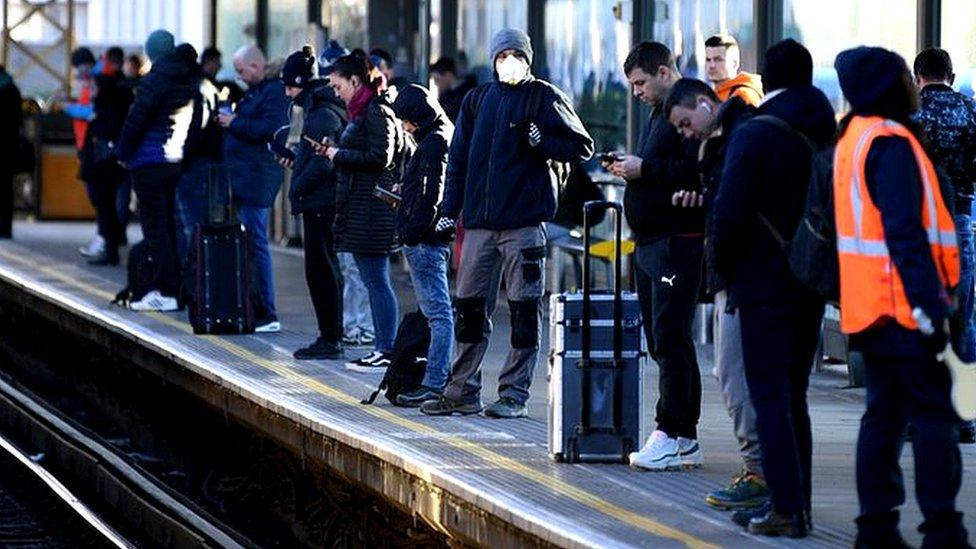Coronavirus: Staggered work times considered when lockdown eases
- Published
Grant Shapps said restrictions for those entering the UK were being considered.
Businesses could be asked to stagger employees' working hours when the coronavirus lockdown eases, the transport secretary has said.
Grant Shapps told the BBC that the move would help to prevent crowded commutes.
He said more buses and trains would run but he hoped to encourage cycling and walking.
Cabinet Office minister Michael Gove said a "staged" easing would mean measures could be reintroduced to tackle "localised" outbreaks.
The government is expected to announce the next steps in its response to the epidemic next Sunday.
Speaking at the government's daily coronavirus briefing, Mr Gove said consultations are under way with employers, trade unions and public health experts to ensure that people return to work in the "safest possible" environments and understand official guidance.
Business groups and unions received draft government guidelines on Sunday, and have until 21:00 BST to respond.
Mr Gove stressed that the UK's approach would not be "flicking a switch and going... back to the old normal".
"A phased approach is one which allows us to monitor the impact that those changes are having on public health," he said.
"And - if necessary, in a specific and localised way - that means that we can pause or even reintroduce those restrictions that might be required in order to deal with localised outbreaks."
It comes as businesses called for a "carefully phased" plan for lifting lockdown restrictions to be set out immediately, as many say they need weeks to prepare for resuming operations.
Rail bosses said last month that social-distancing of any kind would be "extraordinarily difficult" to manage and police, and could reduce the capacity of an individual train by between 70% and 90%.

A SIMPLE GUIDE: How do I protect myself?
AVOIDING CONTACT: The rules on self-isolation and exercise
HOW A VIRUS SPREADS: An explanation
LOOK-UP TOOL: Check cases in your area
TESTING: Can I get tested for coronavirus?

Earlier, Mr Shapps told the Andrew Marr Show that the government was looking at a range of options for people to travel to work, including encouraging what he described as a "massive expansion" in interest in "active travel" such as cycling or walking.
"There are a series of different things that we can do including staggering work times, working with businesses and organisations to do that," he said.
He also said he was working with train companies and unions on maintaining social distancing rules on platforms and at bus stops.
Hand sanitiser could also be made available and one-way systems for passengers introduced, he told Sky News' Sophy Ridge on Sunday.
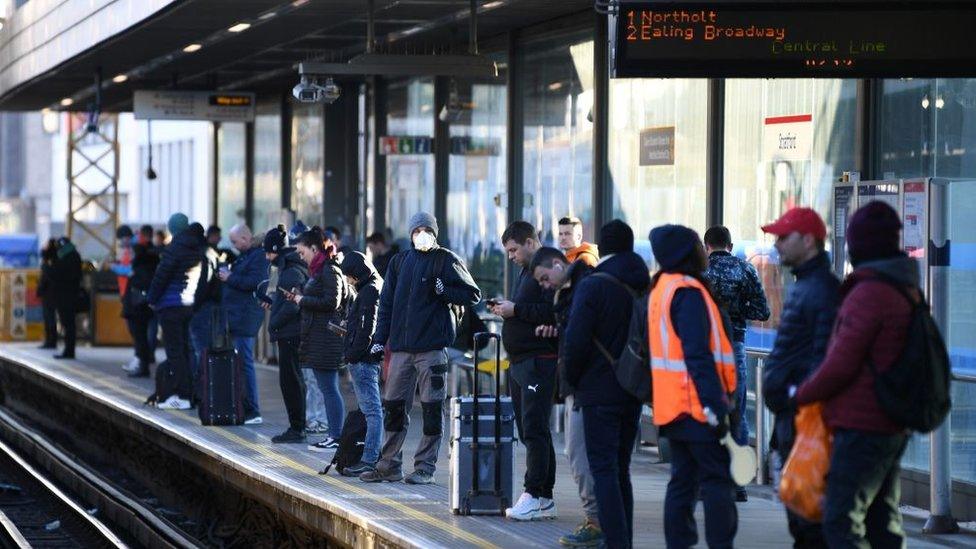
The number of coronavirus-related deaths in the UK stands at 28,446 - an increase of 315 on Saturday's figure.
The government said only 76,500 coronavirus tests were carried out on Saturday, falling short of its daily target of 100,000.
Mr Gove said the dip in the number of tests was due to the fact that fewer people were at work over the weekend.
Dr Elisabetta Groppelli, a lecturer in global health at St George's, University of London, said that 76,500 was still a "fantastic number" and that the UK was "becoming comparable" to countries with similar population sizes.
"What is important is that the UK has steadily increased the number of tests that have been performed," she said.
Mr Shapps said with testing now available to all staff and residents, infection rates were now falling in care homes as well as other parts of the community.
For that reason, he said he hoped the country would avoid care homes transmitting the virus back into the rest of society.
Asked whether fewer people would have died if testing capacity had been greater sooner, he said: "Yes. If we had had 100,000 test capacity before this thing started and the knowledge that we now have retrospectively I'm sure many things could be different."
But he said that although the UK has a big pharmaceuticals industry, it does not have a testing industry like Germany's, making it more difficult to increase test numbers.
Defending the decision not to close airports or introduce screening for international arrivals earlier in the pandemic, Mr Shapps said the advice was that a "complete lockdown of the borders" might only have delayed the virus by three to five days.
"We had millions of people abroad who needed to return home," he said.
But he said that now the infection rate was falling to a more manageable level, plans for screening and quarantining people travelling to the UK from abroad were "a serious point under consideration".
Representative body Airlines UK said a 14-day quarantine period would "effectively kill air travel".
Chief executive Tim Alderslade said it would be a "blunt tool measure" that would "completely shut off the UK from the rest of the world when other countries are opening up their economies" and the UK should be leading the way on common standards such as health screening, which would enable the sector to restart.
In other developments:
Boris Johnson has revealed in an interview with the Sun on Sunday, external that "contingency plans" were made for his death while he was seriously ill in hospital with coronavirus
A survey by the British Medical Association suggests that almost half of doctors in England might be buying their own protective equipment or be reliant on donations
An NHS app aimed at limiting a second wave of coronavirus will be trialled on the Isle of Wight this week, Mr Shapps said
Wales' first minister said schools would need about three weeks to prepare for a phased return and mentioned June as an example of when some children could go back
A group of experts put together by former government chief scientific adviser Sir David King will look at how the lockdown could be eased. Sir David said the group was designed to act as an alternative to the government's own advisers

Do you have any concerns about returning to your workplace? Or are you happy to stop working from home? Tell us about your experience by emailing haveyoursay@bbc.co.uk, external.
Please include a contact number if you are willing to speak to a BBC journalist. You can also contact us in the following ways:
WhatsApp: +44 7756 165803, external
Send pictures/video to yourpics@bbc.co.uk, external
Tweet: @BBC_HaveYourSay, external
Please read our terms & conditions and privacy policy
- Published3 May 2020
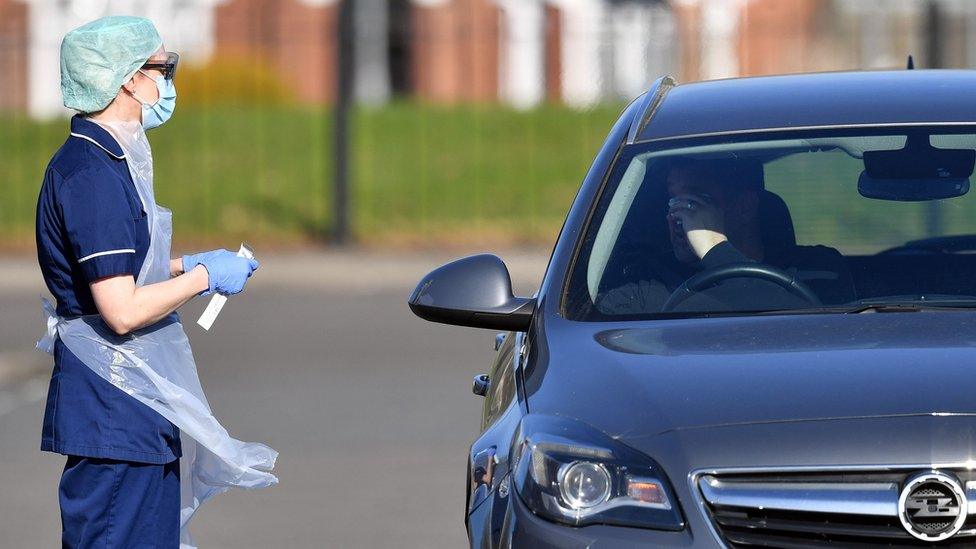
- Published3 May 2020
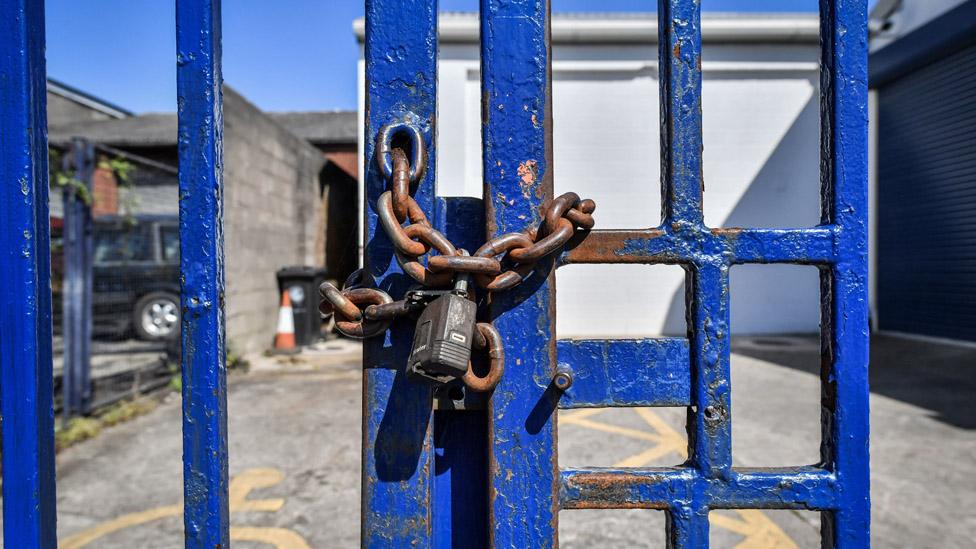
- Published3 May 2020
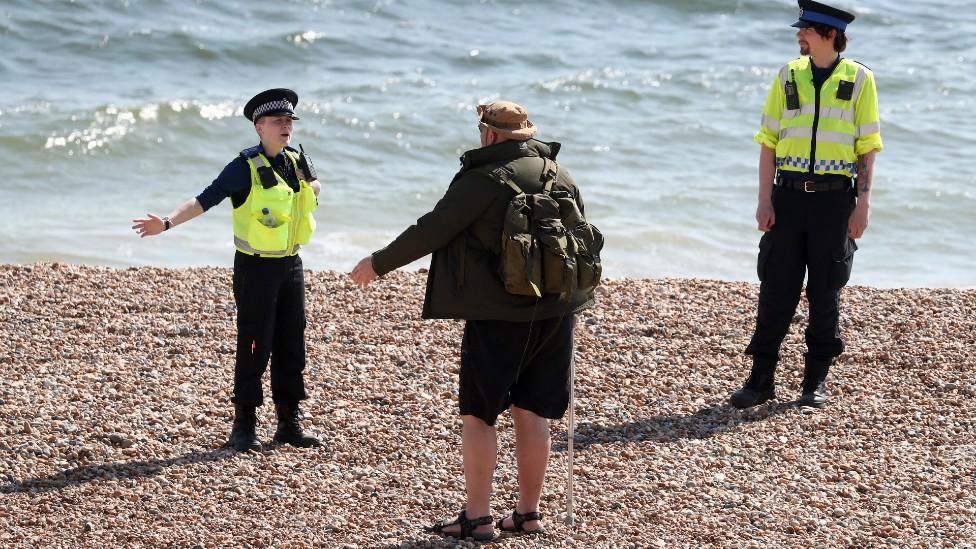
- Published24 April 2020
